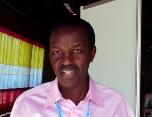What is new with ANEW? EUWI meets Prof Kairu, from ANEW
News details
| “The EUWI grant has allowed ANEW to bring together hundreds of representatives from African civil society to discuss critical water and sanitation issues. We look forward to collaborating with EUWI to manage the high demand from civil society to deal with the challenges ahead”. |
At Stockholm Water Week 2009-08-20, EUWI meets Prof Kairu, from ANEW: African Civil Society Network on Water and Sanitation
| Prof Kairu, what’s new with ANEW? |
|
ANEW stands for the African Civil Society Network on Water and Sanitation. As such, it is a 'network of networks' that is, an umbrella platform. ANEW’s objective is twofold:
|
| How does EUWI practically help the African civil society? Any tangible example? |
|
A first very concrete example is that EUWI has created the EU Water Facility to provide funds for Water and Sanitation. Thanks to this initiative, ANEW has received an EU grant to create a functional platform to discuss specific African water and sanitation issues. This platform now brings together hundreds of Civil Society Organisations (CSOs) across Africa. “EUWI has allowed ANEW bringing together hundreds of African civil society’s representatives to discuss critical water and sanitation issues” ANEW also received funding from the EU Water Facility to support a three year programme of work to promote and improve the capacities of the CSOs for advocacy and participation in policy making. Here comes another tangible example of EUWI’s contribution at the end of the chain:
|
| What is the way forward for EUWI? |
|
ANEW dreams to see an Africa where everyone has access to safe water and adequate sanitation, and we work at it. So far, with more than 400 members from Eastern, Western, Central, Southern and Northern sub regions, ANEW has reached 17 out of 54 African countries. It also means that the demand for membership remains very high. Indeed, more resources are needed. “We look forward to collaborating with EUWI to manage the high demand from civil society to deal with the challenges ahead” In the future, we look forward to better collaboration with EUWI, with a view to managing the high demand now being placed on our network. In that regard, EUWI can help civil society organisations so that they can ever better operate at grass roots level; and of course keep pressurizing African governments to adhere to the commitments of the declarations on a higher political level.
|


Log in with your EU Login account to post or comment on the platform.